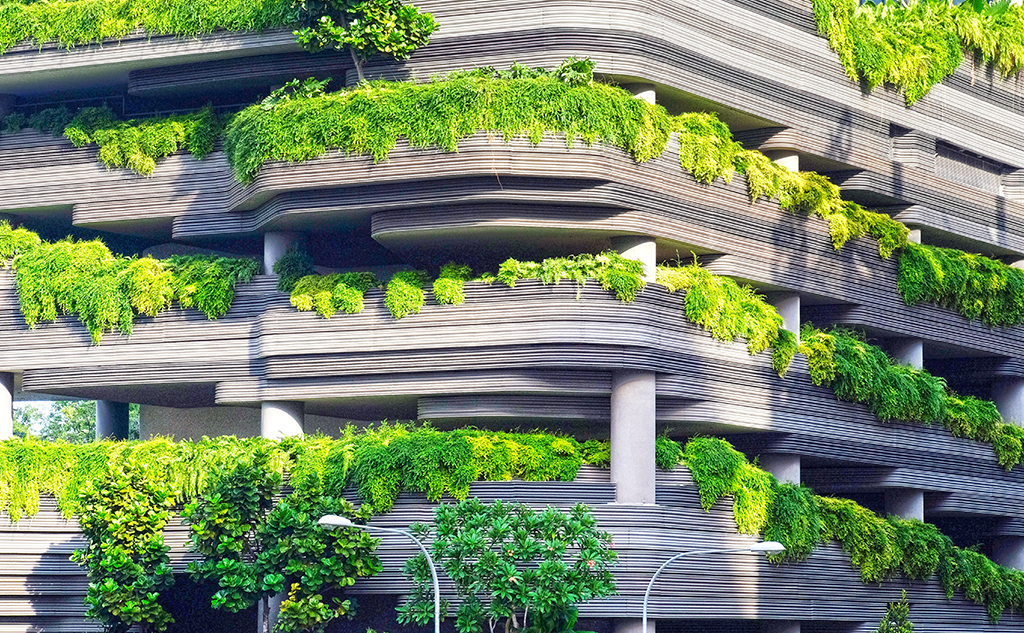In 2003, when France’s then Minister of Sustainable Development commented that the summer heatwave was a taste of summers to come, many people were amused, if not cynical. Now, 20 years on, heatwaves and floods are two of the greatest threats to cities. And – as recent events have further demonstrated – it is no longer a laughing matter. One of the potential solutions, urban greening, lies at the crossroads of mitigation and adaptation. Although this is not a new approach, there are now many actors working on all stages of the process, the outcomes are being assessed, and the approach is seeking certification under France’s Low Carbon Label.
Multi-level benefits
Urban greening offers a whole host of benefits. It allows biodiversity (flora, fauna and micro-organisms) to flourish in our cities. It helps to keep cities cool in summer. It improves citizens’ quality of life and well-being (e.g. by improving air quality through oxygen production, and creating carbon sinks). It contributes towards better water management (e.g. by controlling run-off during heavy rainfall). In addition, it provides local green jobs that cannot be outsourced. In other words, urban greening is a powerful lever for enhancing the appeal of the region.
A growing number of initiatives
Some major French cities are announcing initiatives in this field. Lyon, for example, will be greening its famous Place Bellecour over two stages. Bordeaux is implementing its Grandeur Nature programme, which includes urban cooling islands, micro-forests, permeable surfacing, urban farms and rain gardens. Paris will shortly be planting its third urban forest (at the Place du Colonel-Fabien), following those in Place de Catalogne and in the Charonne district, to ‘combat heat islands and create a biodiversity corridor’. Smaller towns are also taking playing their part. However, many of them are in need of technical and/or financial support.
A digital public service to support decision-making for local authorities
To address this issue, the initiative Plus fraîche ma ville was launched at the end of March 2023. The State-owned start-up, backed by France’s Environment and Energy Management Agency (ADEME), is intended ‘to help local authorities to choose lasting and sustainable urban cooling solutions’. In practical terms, it provides a platform giving accurate information and examples of completed projects (e.g. in Lannion, Nîmes, Sète, Longvic and towns in the Parisian suburbs). The local authority concerned chooses the type of space it wants to change: a roundabout, building, car park, street, square, school playground, park or garden. It will then be offered the solutions best suited to its region and circumstances.
Pillar 2 of the Green Fund
In terms of financial support available, pillar 2 of France’s Green Fund (fund to accelerate the green transition in the regions) focuses on bringing nature back into towns and villages. Under the fund, 500 million euros have been allocated to ‘supporting and accelerating the efforts of local authorities to bring nature into urban spaces’. Eligible initiatives include naturalising soil and urban spaces, incorporating water and aquatic environments into cities, and greening buildings and public amenities. Grants are available for regional assessments and strategic reports, engineering and pre-design studies, and for investment in practical implementation of nature-based solutions in cities.
Adaptation of France’s Low Carbon scheme to urban greening
Consultation is taking place in September 2023 on a version of the Low Carbon Label designed to measure the carbon benefits of greening projects (including increased tree cover). The method will be applicable ‘exclusively in mainland France, for projects based in towns and cities (in the sense of urban units – areas with a high degree of urban development, represented by a continuous built-up area with at least 2,000 inhabitants)’. To be eligible, projects therefore need to be in a municipality that fits the INSEE (French National Statistics Office) definition of an ‘urban unit’. This approach, named Ville arborée has been developed by the Société Forestière de la Caisse des Dépôts.
Will urban greening become mandatory ?
The UNEP report(1) ‘Building Materials and the Climate: Constructing a New Future’, released on 12 September 2023, calls for urban greening to be made mandatory through legislation. A great many operators in the sector seem ready for this.
An evaluation framework for greening buildings
Whether it is applied to roofs or walls, greening of buildings provides the same benefits as urban greening in general (supporting biodiversity, retaining rainwater, improving comfort in summer through plant evapotranspiration, absorbing sunlight and therefore heat, etc.). It also helps to protect the building (improving water and air tightness, protecting from corrosion due to pollution, etc.). According to l’Association des toitures et façades végétales (Adivet)* , the market for green roofs in France is estimated at 1.6 million m² each year, and for green walls at 10,000 m² per year. In spring 2023, the association launched ‘GreenRoofScore’, a framework for evaluating the performance – in terms of ecosystem services – of green roofs and terraces. The planted area of the proposed roof and terrace must cover a minimum of 50 m², or represent at least 30% of the area that could be planted. It covers both new build and renovation projects.
*https://www.adivet.net/
1) UNEP: United Nations Environment Programme https://www.unep.org/
Further reading (in French):
- ‘La rue commune, guide méthodologique pour la transformation des rues ordinaires’, Richez Associés, Franck Boutté Consultants, Léonard (VINCI Group), March 2023, 400 pages, downloadable from
- ‘Enquête sur le bâti végétalisé en France en 2021’, Observatoire Végétalisation des bâtiments, BatiEtude and Adivet, 62 pages, downloadable from www.adivet.net/ressources/bibliographie
Learn more : Sustainable architecture – Designing tomorrow’s city




